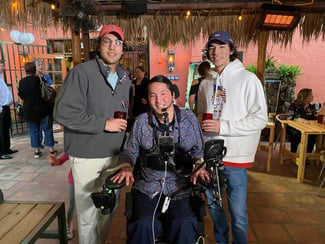Dr. Rex Marco is the Reeve Foundation’s Chief Medical Ambassador, and a fundraiser through his private foundation.
This is a summary of his recent talk for the Reeve Summit, where he shared his experiences during recovery, how his injury has helped him become a better doctor, and his plans for the future.
I'll start with my story. On a day when I was mountain biking, my tire hit something and just stopped. The next thing I knew, I heard a crack. I couldn't tell if I was hurt, because I didn't hurt. All I knew is that I was there, and I wasn't sure if I broke my neck. I thought I might have, though.
What I decided to do was to use my tools for recovery, and what I had learned was to breathe and to be calm and ask for serenity to accept anything that may have happened and courage to change anything that I could. I soon learned that I was paralyzed, and realized that my chance of walking again was less than 5%.
Something that helped me was Tara Brach's book -- Radical Acceptance. I knew that if I could accept this, everything would be okay. And I knew that there had to be a plan for whatever was occurring. And I kept repeating the serenity prayer, something that's helped me when experiencing difficult issues.
In the moments after the accident, as a spine surgeon, I knew the clock was ticking and I needed to get help. I told my friends to safely stabilize my neck and pull me up to the trail. We were in the operating room within two and a half hours. In some ways, it was a blessing to be a physician in that moment.
In other ways, it was very traumatic. As healthcare professionals we see a lot of trauma. I've seen dozens of patients with quadriplegia, and many amputations. I had these visions of pressure ulcers and spit fistulas and other complications. In the ICU, I needed my tools for recovery to work through the stress reactions I was having.
One of the best tools was the Panda Planner. You start each day listing three things you're grateful for. Two of them were always “I'm grateful for life” and “I'm grateful for breath.” You also list three things you're excited for. Those were, “I'm excited for my family, I'm excited to see my friends and I'm excited to see my caregivers.” And I would “write” down a daily affirmation—mine was always "I am enough." My daily focus was to be mindful in the present moment.
 Another tool was loving kindness practice. I would silently repeat the phrases: "May I be kind and compassionate. May I be humble and accepting. May I be honest and accountable. May I be forgiving and committed. May I love kindly and kindly love." This helped me find peace and love and moments of happiness through a very difficult time.
Another tool was loving kindness practice. I would silently repeat the phrases: "May I be kind and compassionate. May I be humble and accepting. May I be honest and accountable. May I be forgiving and committed. May I love kindly and kindly love." This helped me find peace and love and moments of happiness through a very difficult time.
The injury has changed the way I will approach my patients in the future. I now have so much more empathy for everything they're going through. I can put myself in their place. I can feel sorry for what they’re suffering, and I can have compassion.
I also learned ways that we can advocate for ourselves. I discovered that if I communicate from my primary emotion, from a vulnerable standpoint, I can hold a healthy boundary and advocate for myself.
For example, when I'm at home in autonomic dysreflexia, afraid to go to the emergency room because of COVID and trying to get in touch with physicians, and I can't, I can express my concern that there should be a means to communicate and get treatment in that situation.
And when I found out about the help that the Reeve Foundation provides, I was shocked that it took so long. I can advocate that my rehab center should inform their patients sooner that Reeve has so much to offer.
Christopher Reeve once said: "I've always been a crusader for causes I believe in. This time, the cause found me." I feel the same way. While I was lying in the ICU, I had visions of Christopher Reeve, because he's one of my heroes.

 Another tool was loving kindness practice. I would silently repeat the phrases: "May I be kind and compassionate. May I be humble and accepting. May I be honest and accountable. May I be forgiving and committed. May I love kindly and kindly love." This helped me find peace and love and moments of happiness through a very difficult time.
Another tool was loving kindness practice. I would silently repeat the phrases: "May I be kind and compassionate. May I be humble and accepting. May I be honest and accountable. May I be forgiving and committed. May I love kindly and kindly love." This helped me find peace and love and moments of happiness through a very difficult time.